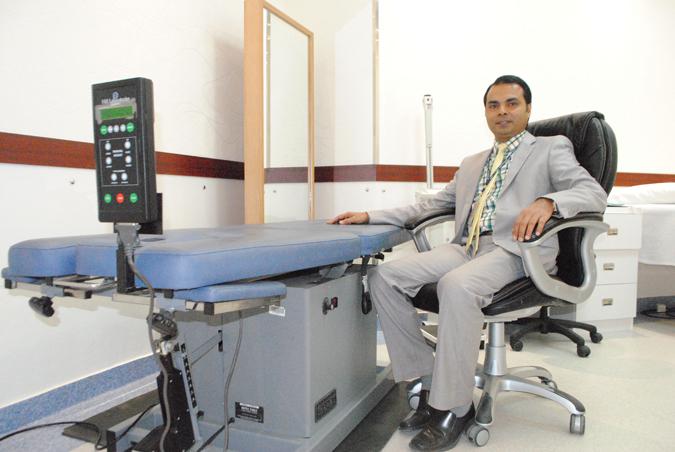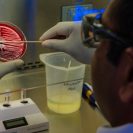Your orthopedist places the x-ray on the lit screen in front of you. You can clearly see the cut in your tibia where half your shin is no longer connected to your foot. The doctor tells you that you don’t need surgery, but you will be off your leg for at least 4 months, if not more. For almost half a year, you are immobilized as you try to acclimate to you new single-legged life. Then, the day you have been waiting for, the cast is coming off.
“The doctors will say it’s completely healed,” said Dr. Sarafudheen Villan, specialist in physical and rehabilitation medicine at Dar Al-Shifa Hospital. “You are expecting the limbs and the joints will be perfect like before, because the doctor says it looks fine. You remove it and you find it is quite awkward.”
This, says Dr. Villan, is one of the many reasons you could be referred to the physiotherapy department and then the tough part really begins. In the time that your leg was in a cast, your muscles were immobilized to ensure your bone heals properly, and you would have experienced muscle atrophy or muscle wasting. Within the first week of your limb’s recovery, the unused muscles decrease in size and ability. The only way to get it back to normal use is through extensive physical therapy and exercise.
At Dar Al-Shifa, Dr. Villan uses a holistic approach in the diagnosis and treatment of patients with this and other similar issues. Unlike other medical conditions, rehabilitation will not work without the patient’s cooperation. There is no pill you can take to make that leg function normally again. Therefore, it is imperative to Dr. Villan that each patient is psychologically prepared for treatment, and does not face complications in his personal life and work that could hinder the recovery.
His main goal, he says, is to restore movement and normal body functions patients may have lost due to injuries like the one described, surgery, an illness or a disability. The majority of patients he sees come in with muscular skeletal issues such as hip or knee replacement, broken bones, post operative or post trauma issues. Once he has completed his investigation, his first focus is pain management.
“Unless the patient cooperates, we can’t do much,” said Dr. Villan. “If they continue to complain of pain during the sessions, we can’t do much. So the first thing we have to do is control the pain, then we address the disabilities.”
Even with pain medication, patients are likely to experience some type of pain or discomfort during the rehabilitation process. Patients need to be aware that to get better they have to set themselves on a path that requires willpower, discipline, perseverance and an incredible amount of patience. The first exercises will be difficult, painful and extremely uncomfortable. Yet, the harder one works, the easier the exercises will get.
Dar Al-Shifa uses some of the most advanced machines in the field to help build up a patient’s muscle strength and flexibility. One such machine is the REPEX table, a state-of-the-art continuous passive motion machine for people with back pain. The patient lies face down on the table and it automatically and passively exercises the lower back to its full available range of motion. The table does all the work, so that there is no additional tension and strain on the muscle.
Along with exercises and massage at the hospital, Dr. Villan also prescribes the patient with at-home exercises that need to be done throughout the day. He likens this recovery process to a gym regimen. Just as a frequent gym-goer will increase muscle mass much quicker than someone who only works out a couple times a week, so goes the recovery process for most of the conditions they see at Dar Al-Shifa’s physiotherapy department.
At the end of the process, Dr. Villan and his team want to see their patients comfortable in their lives, and able to function normally with little to no impairment from an injury. Yet, it isn’t he that makes such a decision, it is the patient and their perseverance that becomes the most important factor in the healing process.
To contact Dar Al-Shifa call 1802 555, visit their website at daralshifa.com or connect with them on Facebook, Twitter or Instagram @daralshifa.











